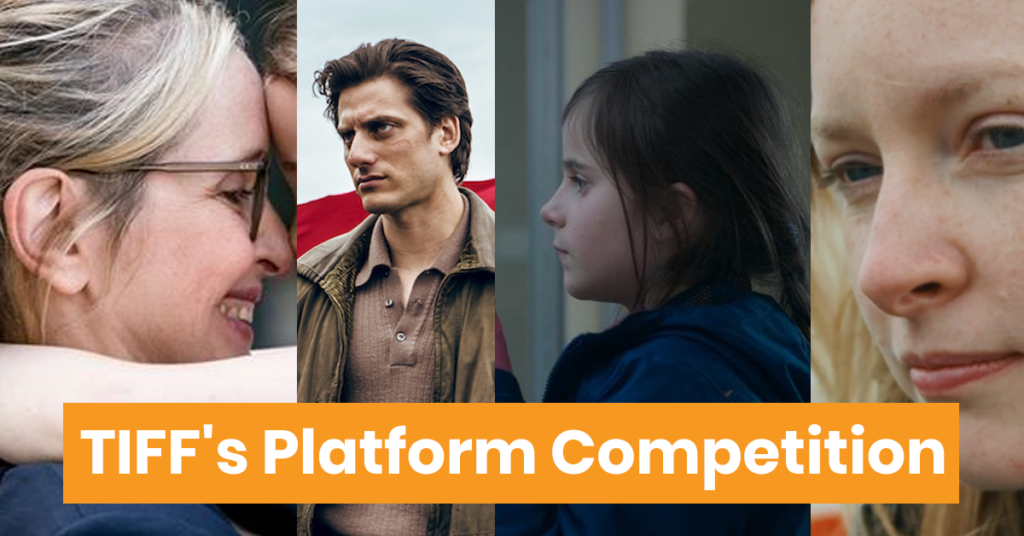Is TIFF’s Platform Competition helping to spotlight great under-the-radar world cinema or merely taking the spotlight away from worthier titles?

TIFF’s Platform competition, now in its fifth year, was a way to rectify a problem TIFF had created with its own programming strategies. Great international films by little known directors were getting buried in its two showcase programs: Discovery, for early-career filmmakers, and Contemporary World Cinema (CWC), for everything else. For years, these two programs have been the biggest gambles of the festival: they always contain some of the very best (if not the best) films of the festival, lots of mediocrity, and some truly terrible films. But there’s little way of knowing which you’ll be walking into.
Less adventurous critics and moviegoers would thus simply avoid these programs — missing some duds, but also missing great films, including some of Seventh Row’s Best Films of the Decade like The Levelling (2016, Discovery), Rhymes for Young Ghouls (2013, Discovery), Our Loved Ones (2015, CWC), Angels Wear White (2017, CWC), Aquarius (2016, CWC), Charlie’s Country (2013, CWC) and Sergio & Sergei (2017, CWC). If most of these films are new to you, that’s further proof that both critics and festivals failed to give them the attention they deserved.
Is Platform benefiting the films or are its films benefiting it?
With Platform, TIFF picks ten to twelve films from unknown filmmakers that it could really put its weight behind, hopefully giving them the showcase they really deserve. Even from its inception, the programming for the section has always been strong: there have been almost no bad films. On the other hand, there have been many films that would have been hits without Platform, and that neither helped Platform with its branding nor particularly benefit the film (Barry Jenkins’ Moonlight, Pablo Larrain’s Jackie) and films that were great but still nobody saw (Fien Troch’s Home, Katell Quillévéré’s Heal the Living) that disappeared into obscurity. Even winning the Platform Prize has never been a guarantee of a distribution deal, let alone an audience boost. Alan Zweig’s HURT, a Canadian doc which won the prize in Platform’s first year, has all but disappeared; even in Canada, you can’t find it on VOD. Last year’s winner, Cities of Last Things, has all but vanished.
Even when the prize has put its weight behind films that do make it out of the festival circuit, three out of the five years, these have been Venice Film Festival titles that had already won big there. When people think of past Platform winners Jackie, Sweet Country, and this year’s Martin Eden, they think of these as Venice titles, not Platform-anointed ones. I suspect that these films were often added to the lineup more to give prestige to Platform than to help Platform give prestige to them.
TIFF’s Platform branding problem
Since its inception, Platform has had a branding problem, though TIFF is working towards fixing it. What makes a film eligible has always been elusive, especially as the current criteria are “films with bold directorial visions,” according to this year’s press release. Still, does this mean the prize is one for the best direction or the best film? Especially in this year’s competition, it hardly went to the best film (Proxima), but did go to one of the showiest (Martin Eden) as if it were a prize for Most Direction.
Five years into the program, Platform is now a guarantee of quality cinema — no altogether bad films, if not all great films — and yet, I can’t help but wonder if this does an even bigger disservice to the festival’s Discovery and CWC programs, which were already struggling to compete for audiences, especially critics who could help make or break distribution deals. If the best films were still in CWC or Discovery, did they have an even lesser chance of being seen?
Two of the best films of the festival were both first features in the Discovery section, both directed by women and about uniquely female experiences. Hope, about a woman who discovers her cancer has returned and has to cope with the crisis in her relationship with her husband; and Noura’s Dream, about a woman trying to get herself and her children out of an abusive marriage, but who faces systemic pushback at every stage. Both are chamber pieces that use blocking masterfully to reveal power dynamics, and both feature understandable, if not always likeable, male characters. Neither got much press as Discovery titles; both were more exciting films and stories than the male-directed Platform titles The Moneychanger and Workforce.
Nevertheless, some Platform directors did report an increase in critical interest in their films because of the Platform slot. To my mind, this is most important for Canadian films which are often dismissed as only being accepted at the festival for the government funding when, in fact, Canadian cinema has been producing many of the best films at TIFF in the last five years. When we talked to director Kazik Radwanski at TIFF, whose Anne at 13,000 Feet was one of the highlights of the festival and the Platform section, he noted that a Platform bow felt like a stamp of approval from the festival, that the film deserved to be at TIFF. As Radwanski noted, “We’re in such good company. I really admire a lot of the filmmakers in the programme.”
Canadian films in TIFF’s Platform Competition
 Still from HURT with Steve Fonyo, courtesy of TIFF
Still from HURT with Steve Fonyo, courtesy of TIFF Still from Those Who Make Revolution Halfway Only Dig Their Own Graves
Still from Those Who Make Revolution Halfway Only Dig Their Own Graves Still from Maliglutit. Courtesy of TIFF
Still from Maliglutit. Courtesy of TIFF
Yet TIFF has never programmed more than two Canadian films in Platform in any given year, even during the days of an expanded program, sometimes even programming none. In 2015, there was HURT; 2016, Those Who Make Revolution Halfway Only Dig Their Own Graves and Maliglutit; 2017 and 2018, none; and 2019, Anne at 13,000 Feet. When you consider that Cannes usually programmes three or four French films in a competition of twenty, TIFF is really under-serving homegrown talent.
Making room for Canadian films in Platform would not require creating a quota, per se, so much as merely considering these films as equally valid competitors — something we, in Canada, are unlikely to do before a film gets international approval first. This year, two Canadian films stood out as particularly directorially daring and would have benefited from a Platform bow: Sophie Deraspe’s modern retelling of Antigone or Elle Máija-Tailfeathers’ and Kathleen Hepburn’s single-take The Body Remembers When the World Broke Open. Last year, Keith Behrman’s Giant Little Ones, Sebastien Pilote’s The Fireflies Are Gone, and Helen Haig-Brown and Gwaai Edenshaw’s Edge of the Knife would have all made great picks and put these terrific films in front of a bigger audience (Fireflies still hasn’t received US distribution). All of these films are at least as good as the ones programmed in Platform — many are better and more daring than some of those titles.
The ethos of the competition
The trouble is, I’m not sure anyone, including the Platform programmers, can really describe what belongs in this competition. If this year’s improvisation-heavy Rocks, which featured heavy collaboration between a diverse group of teenage non-actors and the writing team got a slot in the competition, why couldn’t the equally audacious The Body Remembers, for its real-time storytelling featuring Indigenous storytellers? If Julie Delpy’s My Zoe, a film that starts as a family drama and turns into a very silly sci-fi story, deserved a slot, why not also Canada’s formally audacious White Lie, about a Canadian university student who gets trapped in her own lie of pretending to have cancer? Five years in, the Platform Competition continues to have excellent programming, but until TIFF decides exactly what its purpose is, it will be difficult for the competition to fulfill it.

